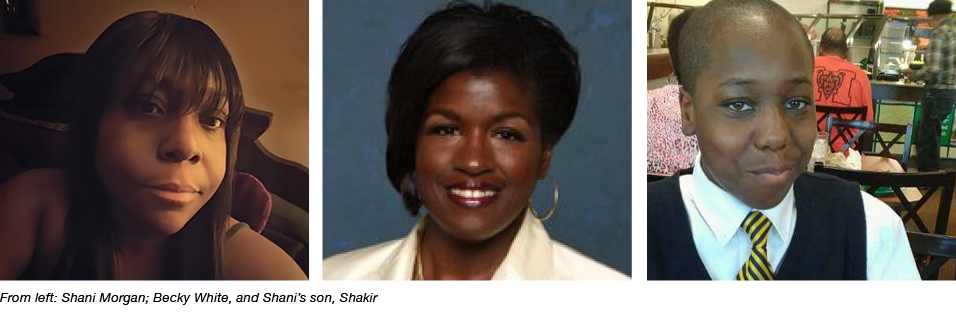
In the summer of 2001, Shani Morgan was a few months pregnant and in prison, where she learned that she had HIV. She’d been sent from jail to Bragg Street Women’s Prison in Raleigh for better monitoring and medical treatment. What she remembers most about being treated by her UNC doctor, Becky White, MD, MPH, for HIV that summer is the look on White’s face after she researched the best course of antiretroviral treatment.
“She was looking through these books, it took about an hour,” Morgan remembers. “But then she had that look on her face like she’d found the holy grail.”
Nearly twenty years later, Morgan wrote to UNC hoping to find White (who was Dr. Stephenson then, before she married) to thank her for her care and to let her know how well she was doing. White, an associate professor of medicine in UNC’s Division of Infectious Diseases, is co-director of HIV Services for the North Carolina Department of Corrections.
“I think she would be proud to know that my son was born completely healthy due to the regimen that she prescribed in July 2001 that got me undetectable by that September,” Morgan wrote. “I was released that November and my son was born in January 2002. I’m extremely blessed that I will be celebrating 20 years of being undetectable in September. My son is an only child because I didn’t want to chance a second pregnancy or have more children than I could afford.”
Morgan’s note reached White in early January 2021, and White arranged a Zoom call for the two to connect. When White met Morgan, “I was pretty young and not experienced with treating pregnant women,” she says. “I was just finishing my fellowship and had started a contract with the state prison system, treating men and women with HIV.” Doctors and nurses working in prisons needed to spend more time with HIV-positive women than men, White remembers. “Women had so many issues, a lot of it around trust.” The nurses she worked with then in the prisons were “incredibly organized. We had tremendous teamwork with the nurses, the pharmacy. Working with vulnerable populations, it takes a whole team of people.”
White helped to conduct the first randomized controlled trial of directly observed antiretroviral therapy vs. self-administered antiretroviral therapy in a state prison system. She also has helped implement a first-ever HIV opt-out screening in the North Carolina prison system. Recently she has expanded her research focus on the HIV at-risk community from HIV screening/testing to access and adherence to highly active antiretroviral therapy in underserved populations. Her clinical interests include treatment of HIV infection and syphilis.
Morgan knew she was in good hands with White. “I felt very comfortable with her care,” she says, “and with the time she took with me.”
“Every six months or so someone will come up to me and say, ‘Dr. Stephenson, you treated me at Central Prison, and I’m doing well.'” Hearing Morgan’s story and learning about Shakir, she says, is an important reminder about working with vulnerable populations. “It’s important to know that what you do for someone affects others, too.”
Shortly after her release from prison, Morgan moved to Atlanta. There she was connected with multiple services to help her with housing, nursing care for her son, medical and mental health care, and other assistance. “Having a routine, a place to live, and a schedule so you don’t forget to take your meds, that all helped,” Morgan says. She is still on the same regimen, two pills morning and night. On the Zoom call, White told her she could go to a new therapy of just one pill a day, but Morgan said she’s fine. “If it ain’t broke, don’t fix it,” she laughed.
Her son, Shakir (which means thankful in Swahili), turns 19 on January 15. In August 2020 he began his freshman year at Elon College, studying computer science and graphic design.
“It’s good to hear that you are doing so well,” White told Morgan. “Folks who go through the correctional system have a lot of challenges. It’s a remarkable achievement to be sending a child to college.”
“I can’t thank you enough for saving my life,” Morgan told White. “I wanted you to know that your decisions are why I am still alive.”
